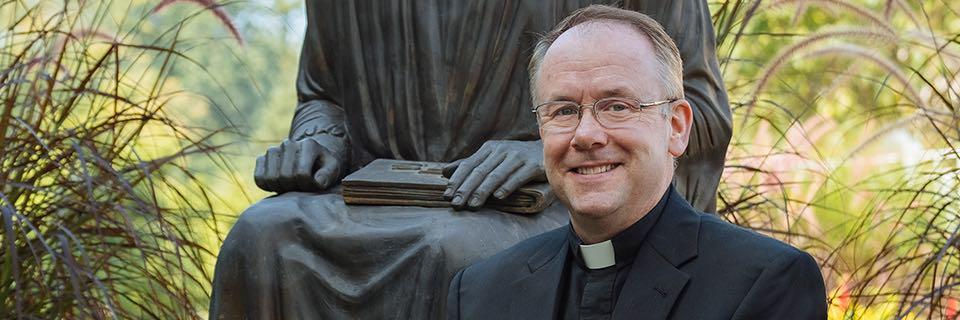Jesuit, Professor of Education Relishes His Own Chances to Learn

One of the distinguishing features of the early Society of Jesus, and something that continues to distinguish its members, is its global perspective.
Early Jesuits traveled across the globe, to places like China, as both spiritual and intellectual missionaries.
For many Jesuits today, following their vocation brings with it a willingness to travel to far-flung parts of the globe and embrace unfamiliar cultures.
The newest member of the Jesuit community at Rockhurst University, the Rev. Brian Frain, S.J., who is also an assistant professor of education in the College of Health and Human Services, knows this well. During a challenging tenure in Myanmar, this Philadelphian son of an Irish immigrant he said he found his sense of faith broadened, not tested.
It’s one chapter in a long journey from his childhood on the East Coast. Fr. Frain said he was raised Catholic and attended silent retreats during his undergraduate years. Those would prove to be pivotal moments, though not for some time afterward.
“I didn’t give it serious consideration at that time,” he said. “I don’t think I wanted to settle down, necessarily, right then. It took me six years to decide whether to enter the candidacy program.”
In college, Fr. Frain had two other formative experiences — a study abroad experience in Florence, Italy, and a summer job in a Campbell’s Soup factory, where he learned about mainframes and computers. After graduating with a degree in international relations and a business minor, Fr. Frain started working in information systems in Houston. It was work he found interesting, but after being laid off — on his birthday — in 1987, Fr. Frain said he began to consider more deeply a religious calling upon returning to Philadelphia.
“Every day I would wake up and say ‘how is this helping me make a decision as to what to do with my life?’” he said. “And I didn’t have a clear answer for that.”
So it was time for a change, and Fr. Frain said because the Jesuits were so dedicated to the mission of education, there were few better places to determine the nature of his calling than the classroom.
“I taught in the archdiocese in Philadelphia, eighth grade, and I loved it,” he said. “They were really important years of my life, for growing and for discernment.”
Entering the Jesuits in the New York province and spending his novitiate in Syracuse, New York, Fr. Frain grew in his faith and in his studies, earning a master’s degree in education along the way. But it also meant making sacrifices, like giving up the Irish dance schools that he helped found when he was in Philadelphia. For most of his life, Fr. Frain said, Irish dance has been a hobby, a means of self-expression, and a connection to his parents and their shared heritage in Ireland (he added he hopes to start an Irish dance club at Rockhurst).
“I was introduced to Irish dance was I was about 5,” he said. “My parents threw me up on stage and at first I would pretend, but then I started taking lessons. Those schools were probably the hardest thing to give up. But I would say I always kept my hand in it — I guess I always kept my feet in it.”
In 2004, Fr. Frain jumped feet-first into a new challenge when his province sent him to Rangoon, Myanmar, where he pursued seminary study and managed the Campion English Language Institute. Living as part of an incredibly diverse international Jesuit community and serving a Catholic population much different than that of the American congregations he grew up with, Fr. Frain said he again learned not only a new language, but a lot about himself, about the world, and about his faith.
“I think it gave me a much bigger picture of the Catholic Church,” he said. “I sort of learned how to be Catholic in a new way when I was in Myanmar.”
At Rockhurst, Fr. Frain will also be the director of the Thomas More Center for Catholic Studies, and he said he hopes to incorporate the sorts of revelations he’s had into students’ and faculty’s understanding of what role Catholic theology and culture plays in the contemporary world.
“I’m very interested in studying Catholic culture in the 21st Century, and how it maintains its past into the present,” he said. “The face of the church is changing, along with the culture. And I want to find ways for faculty and students to engage with what those changes mean for the Church and for all of us.”







